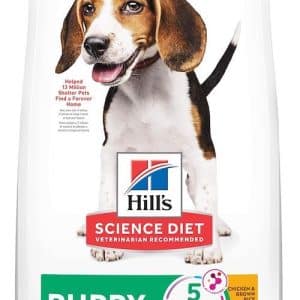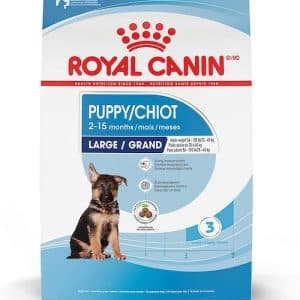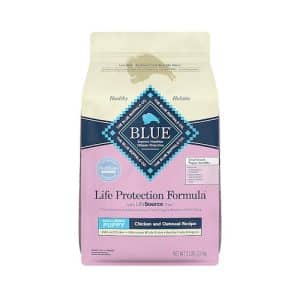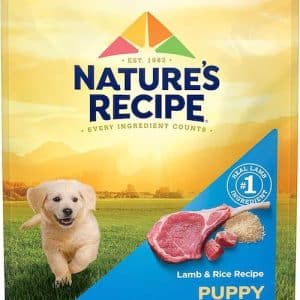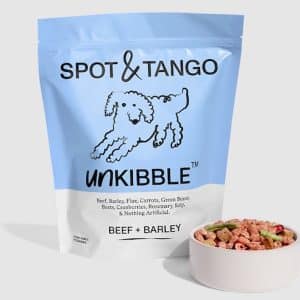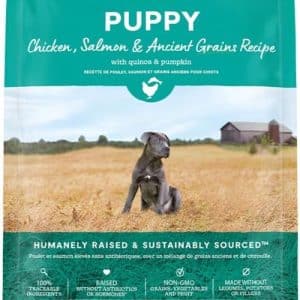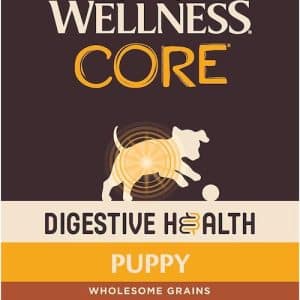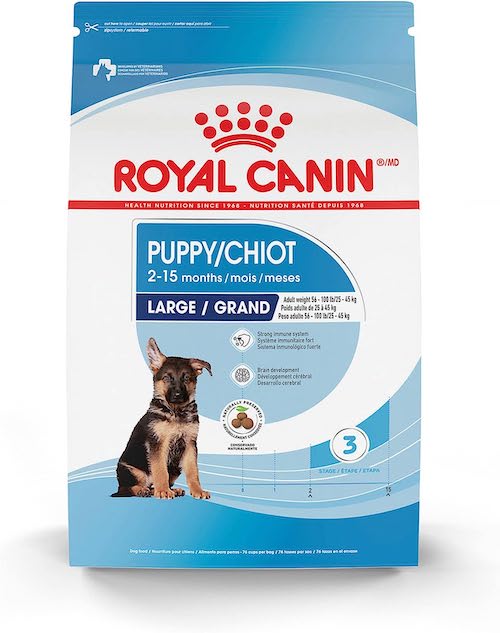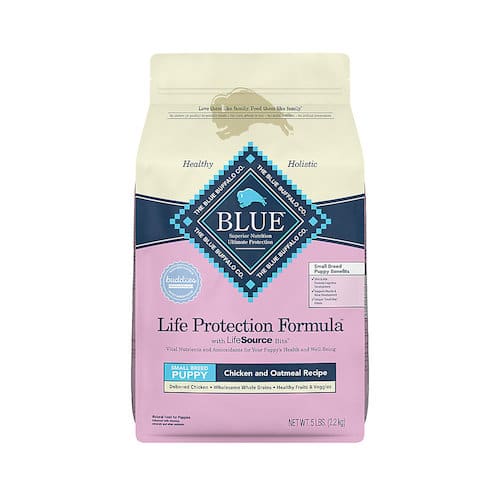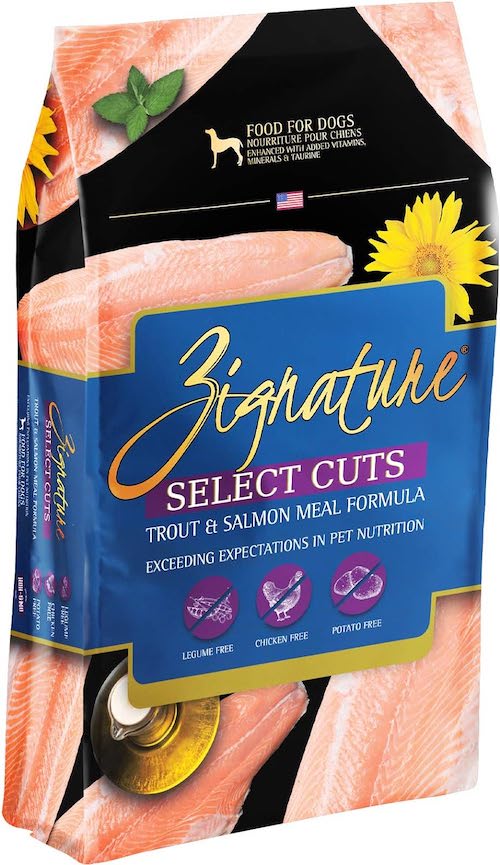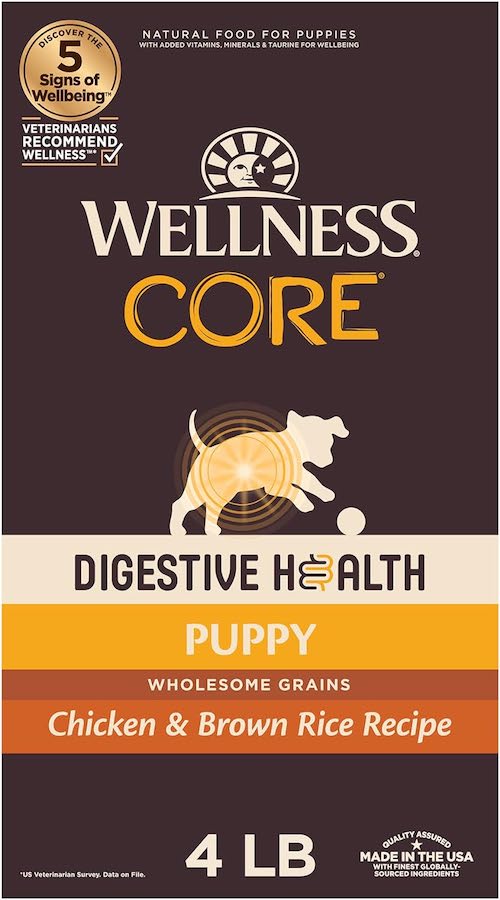- This review contains affiliate links. Read more here.
- Not a substitute for professional veterinary help.
For many new puppy parents, dry food will be the diet of choice: it’s convenient to serve and store, it’s generally more affordable, and it can provide all of the nutrients your growing puppy needs. The best dry food for puppies will offer sufficient protein for developing bodies while balancing critical nutrients like calcium and phosphorus.
Dry food options abound—but which ones are worthy of your puppy’s bowl? Along with feedback from your veterinarian, choosing a dry puppy food will come down to considerations like storage requirements, nutrient profiles, a company’s processing methods, and your puppy’s personal preferences.
We’ve sorted through the scores of puppy kibble available to bring you 11 AAFCO-compliant options that address different dietary needs. This list serves as a good starting point on your search, but ultimately, it’s up to you and your vet to make the best choice for your pup.
Our picks
Best Kibble Overall: Hill’s Science Diet Dry Puppy Food
Hill’s represents one of the most trusted brands in the pet food industry, with hundreds of veterinarians and nutritionists behind the development of each formula. To ensure a palatable experience for your pup, every recipe is taste-tested by dogs at the company’s Pet Nutrition Center.
This dry kibble features puppy-sized pieces (4mm x 10mm) that will work for both small and large breeds. Like all Science Diet foods, it includes clinically proven antioxidants to promote a healthy immune system. It also contains fish oil for brain and eye development and prebiotics for a healthy digestive system.
Key Nutrients:
- 393 kcal/cup
- Protein: 27.8%
- Fat: 19%
- Carbohydrate: 42.4 %
- Crude Fiber: 2.5 %
- Calcium: 1.54 %
Ingredients: Chicken, Brown Rice, Whole Grain Wheat, Chicken Meal, Chicken Fat, Whole Grain Corn, Whole Grain Oats, Pea Protein, Soybean Meal, Hydrolyzed Chicken Flavor, Ground Pecan Shells, Dicalcium Phosphate, Lactic Acid, Pork Liver Flavor, Soybean Oil, Iodized Salt, Flaxseed, Dried Beet Pulp, Dried Citrus Pulp, Potassium Chloride, Fish Oil, Choline Chloride, Pressed Cranberries, vitamins (Vitamin E Supplement, L-Ascorbyl-2-Polyphosphate (source of Vitamin C), Niacin Supplement, Thiamine Mononitrate, Vitamin A Supplement, Calcium Pantothenate, Riboflavin Supplement, Biotin, Vitamin B12 Supplement, Pyridoxine Hydrochloride, Folic Acid, Vitamin D3 Supplement), L-Threonine, DL-Methionine, minerals (Ferrous Sulfate, Zinc Oxide, Copper Sulfate, Manganous Oxide, Calcium Iodate, Sodium Selenite), Taurine, Mixed Tocopherols for freshness, Natural Flavors, L-Tryptophan, Beta-Carotene
Best for Large Breed Puppies: Royal Canin Large Puppy Formula
Royal Canin recognizes that large-breed puppies have unique needs, and this veterinarian-developed recipe aims to address all of them. Formulated for bigger breed puppies expected to reach 56-100 pounds at maturity, this dry food offers a specific mineral blend to promote bone and joint health.
At 349 kcal per cup, it sits on the lower end of caloric density to satisfy the moderate energy needs of larger puppies. It also contains over 30% protein on a dry matter basis to help build strong muscles. And the lower fat content (15.56% on a dry matter basis) prevents obesity and keeps large puppies from growing too rapidly, which can result in musculoskeletal issues.
Key Nutrients:
- 349 kcal/cup
- Protein: 31.11%
- Fat: 15.56%
- Carbohydrate: 49.22%
- Crude Fiber: 4.11%
Ingredients: Chicken By-Product Meal, Corn, Wheat, Chicken Fat, Wheat Gluten, Brewers Rice, Natural Flavors, Brewers Rice Flour, Dried Plain Beet Pulp, Corn Gluten Meal, Monocalcium Phosphate, Sodium Aluminosilicate, Vegetable Oil, Salt, Calcium Carbonate, Potassium Chloride, Powdered Psyllium Seed Husk, Pea Fiber, Fish Oil, Taurine, Fructooligosaccharides, Choline Chloride, Hydrolyzed Yeast, Marine Microalgae Oil, Dl-Methionine, Vitamins[Dl-Alpha Tocopherol Acetate (Source Of Vitamin E), L-Ascorbyl-2-Polyphosphate (Source Of Vitamin C), Biotin, D-Calcium Pantothenate, Vitamin A Acetate, Niacin Supplement, Folic Acid, Pyridoxine Hydrochloride (Vitamin B6), Vitamin B12 Supplement, Thiamine Mononitrate (Vitamin B1), Vitamin D3 Supplement, Riboflavin Supplement], Trace Minerals[Zinc Proteinate, Zinc Oxide, Manganese Proteinate, Ferrous Sulfate, Manganous Oxide, Copper Sulfate, Sodium Selenite, Calcium Iodate, Copper Proteinate], Marigold Extract (Tagetes Erecta L.), Glucosamine Hydrochloride, Yucca Schidigera Extract, Chondroitin Sulfate, Carotene, Rosemary Extract, Preserved With Mixed Tocopherols And Citric Acid
Best for Small Breed Puppies: Blue Buffalo Life Protection Small Breed Formula
Because of their fast metabolisms, small-breed puppies require more calories per pound of body weight than large-breed puppies. With 417 kcal per cup, this Blue Buffalo formula is more calorically dense than our large-breed recommendation. It also includes the brand’s “LifeSource Bits”: the dark-colored pieces of kibble that contain a vet-developed blend of vitamins, minerals, and antioxidants.
For your small puppy’s comfort and safety, this recipe features a smaller kibble size. Plus, the purposeful shape is intended to promote dental health by removing tartar.
Key Nutrients:
- 417 kcal/cup
- Protein: 32.22%
- Fat: 18.89%
- Carbohydrate: 43.33%
- Crude Fiber: 5.56%
- Calcium: 1.4%
Ingredients: Deboned Chicken, Chicken Meal, Oatmeal, Barley, Fish Meal (source of Omega 3 Fatty Acids), Dried Egg Product, Peas, Brown Rice, Chicken Fat (preserved with Mixed Tocopherols), Natural Flavor, Dried Tomato Pomace, Flaxseed (source of Omega 6 Fatty Acids), Pea Protein, Fish Oil (source of ARA-Arachidonic Acid and DHA-Docosahexaenoic Acid), Salt, Dicalcium Phosphate, Direct Dehydrated Alfalfa Pellets, Potassium Chloride, Dried Chicory Root, Choline Chloride, Potatoes, Pea Fiber, Alfalfa Nutrient Concentrate, Calcium Carbonate, DL-Methionine, preserved with Mixed Tocopherols, Vitamin E Supplement, Sweet Potatoes, Carrots, Garlic, Zinc Amino Acid Chelate, Zinc Sulfate, Vegetable Juice for color, Ferrous Sulfate, Iron Amino Acid Chelate, Blueberries, Cranberries, Barley Grass, Parsley, Turmeric, Dried Kelp, Yucca Schidigera Extract, Niacin (Vitamin B3), Calcium Pantothenate (Vitamin B5), L-Ascorbyl-2-Polyphosphate (source of Vitamin C), L-Lysine, Copper Sulfate, Biotin (Vitamin B7), L-Carnitine, Vitamin A Supplement, Copper Amino Acid Chelate, Manganese Sulfate, Taurine, Manganese Amino Acid Chelate, Thiamine Mononitrate (Vitamin B1), Riboflavin (Vitamin B2), Vitamin D3 Supplement, Vitamin B12 Supplement, Pyridoxine Hydrochloride (Vitamin B6), Calcium Iodate, Dried Yeast, Dried Enterococcus faecium fermentation product, Dried Lactobacillus acidophilus fermentation product, Dried Aspergillus niger fermentation extract, Dried Trichoderma longibrachiatum fermentation extract, Dried Bacillus subtilis fermentation extract, Folic Acid (Vitamin B9), Sodium Selenite, Oil of Rosemary
Best for Medium Breed Puppies: Eukanuba Medium Breed Puppy Food
It’s challenging to find puppy food developed specifically for medium breeds (Royal Canin is the only other option we could find). This WSAVA-compliant recipe from Eukanuba offers a complete and balanced diet for medium-breed puppies with an expected adult weight of 24-55 pounds. A 32.22% protein level makes this formula a solid choice for canine athletes. It also provides clinically proven levels of DHA for developing brains—an important aid for puppies who are constantly learning and training. Finally, balanced levels of calcium and phosphorus support bone health and muscle growth.
Key Nutrients:
- 431 kcal/cup
- Protein: 32.22%
- Fat: 20%
- Carbohydrate: 44%
- Crude Fiber: 3.78%
- Calcium: 1.13%
Ingredients: Chicken, chicken by-product meal, corn, chicken fat, wheat, ground grain sorghum, brewers rice, natural flavors, dried plain beet pulp, fish oil, egg product, potassium chloride, salt, dicalcium phosphate, fructooligosaccharides, choline chloride, calcium carbonate, vitamins [DL-alpha tocopherol acetate (source of vitamin E), biotin, D-calcium pantothenate, vitamin A acetate, niacin supplement, pyridoxine hydrochloride (vitamin B6), thiamine mononitrate (vitamin B1), vitamin B12 supplement, riboflavin supplement, vitamin D3 supplement, folic acid], trace minerals [zinc oxide, ferrous sulfate, copper sulfate, sodium selenite, calcium iodate], magnesium oxide, rosemary extract, preserved with mixed tocopherols and citric acid
Best for Toy Breeds: Purina Pro Plan Toy Breed Puppy Formula
Purina develops its recipes with a team of scientists, veterinarians, nutritionists, and behaviorists. In addition, the company voluntarily conducts feeding trials, and its Pro Plan line is hugely popular with pet parents and their pups. This particular blend offers complete and balanced nutrition for toy breed puppies with an expected adult weight of less than 10 pounds.
This kibble accounts for speedy metabolisms with a significantly higher calorie content (533 kcal per cup) than most dry foods. And tiny kibble pieces are sized perfectly for smaller jaws. This food also contains a 2% minimum of Omega-6 fatty acids, as well as DHA, probiotics, and antioxidants.
Key Nutrients:
- 533 kcal/cup
- Protein: 38.64%
- Fat: 22.73%
- Carbohydrate: 35.23 %
- Crude Fiber: 3.41%
- Calcium: 1.1%
Ingredients: Chicken, Corn Gluten Meal, Rice, Poultry By-Product Meal, Beef Fat Preserved With Mixed-tocopherols, Whole Grain Corn, Fish Meal, Dried Egg Product, Corn Germ Meal, Natural Flavor, Fish Oil, Potassium Chloride, Salt, Soybean Oil, Calcium Carbonate, Mono And Dicalcium Phosphate, Choline Chloride, L-lysine Monohydrochloride, Magnesium Sulfate, Minerals [Zinc Sulfate, Ferrous Sulfate, Manganese Sulfate, Copper Sulfate, Calcium Iodate, Sodium Selenite], Vitamins [Vitamin E Supplement, Niacin (Vitamin B-3), Vitamin A Supplement, Calcium Pantothenate (Vitamin B-5), Thiamine Mononitrate (Vitamin B-1), Vitamin B-12 Supplement, Riboflavin Supplement (Vitamin B-2), Pyridoxine Hydrochloride (Vitamin B-6), Folic Acid (Vitamin B-9), Menadione Sodium Bisulfite Complex (Vitamin K), Vitamin D-3 Supplement, Biotin (Vitamin B-7)], Dl-methionine, Dried Bacillus Coagulans Fermentation Product, Garlic Oil
Best Budget Option: Nature’s Recipe Lamb & Rice Dry Food
At $1.88/pound on Chewy, this Nature’s Recipe puppy food presents an affordable option that maintains its nutritional integrity. This lamb and rice formula meets the AAFCO’s nutrient profiles for all life stages, including large breed puppies. It includes menhaden fish oil, which provides DHA for brain and eye development. And it contains whole grains like barley and oatmeal to provide fiber for good digestion.
Key Nutrients:
- 347 kcal/cup
- Protein: 28.89%
- Fat: 16.67%
- Carbohydrate: 49.44%
- Crude Fiber: 5%
- Calcium: 1.2%
Ingredients: Lamb, Chicken Meal, Brewers Rice, Barley, Oatmeal, Canola Meal, Rice Bran, Poultry Fat (Preserved With Mixed Tocopherols), Menhaden Fish Meal, Turkey Meal, Natural Flavor, Flax Seed, Salt, Potassium Chloride, Menhaden Fish Oil (Preserved With Mixed Tocopherols), Taurine, Dl-Methionine, Vitamins (Vitamin E Supplement, Niacin, Ascorbic Acid (Source Of Vitamin C), Thiamine Mononitrate, Pantothenic Acid, Vitamin A Supplement, Riboflavin Supplement, Pyridoxine Hydrochloride, Folic Acid, Biotin, Vitamin B12 Supplement, Vitamin D3 Supplement), Minerals (Ferrous Sulfate, Zinc Sulfate, Copper Sulfate, Sodium Selenite, Manganese Sulfate, Calcium Iodate), Choline Chloride, Lactic Acid, Citric Acid (Used As A Preservative), Yucca Schidigera Extract, L-Threonine, Rosemary Extract
Best Subscription: Spot & Tango Unkibble
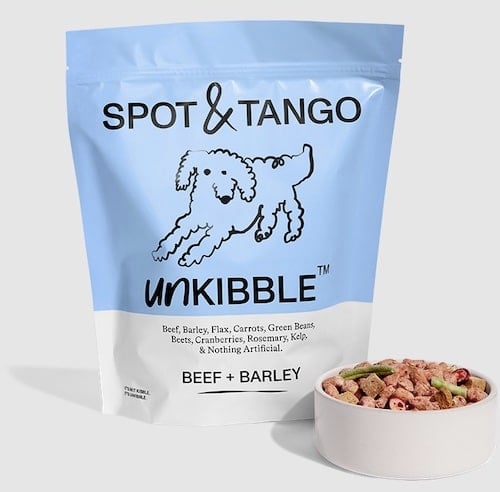
Spot & Tango Unkibble
A unique take on dry food, UnKibble blends the convenience of kibble with the benefits of fresh food.
Most pet food subscription services are limited to fresh foods that require refrigeration. Spot & Tango sets itself apart by offering a dry food that incorporates fresh meats and veggies. The brand’s unique “UnKibble” is gently dehydrated at low temperatures to preserve its natural vitamins and minerals. Each UnKibble recipe features a limited ingredient list and is considered complete and balanced for all life stages and breed sizes.
Meal sizes are uniquely tailored to your pup based on their age, weight, breed, and activity level. For easier serving, a customized portioning scoop is included in your order.
Key Nutrients (Turkey + Sweet Potato Recipe):
- 4,367 kcal/kg
- Protein: 25.77%
- Fat: 19.59%
- Carbohydrate: 51.55%
- Crude Fiber: 3.09%
Ingredients: Turkey, Brown Rice, Turkey Liver, Sweet Potatoes, Turkey Heart, Flax Seeds, Apples, Cranberries, Spinach, Salmon Oil, Ginger, Salt, Dried Kelp, Mixed Tocopherols, Dicalcium Phosphate, Calcium Carbonate, Potassium Chloride, Choline Chloride, L-Tryptophan, L-Threonine, Zinc Proteinate, Iron Amino Acid Chelate, Vitamin E, Selenium Yeast, Copper Amino Acid Chelate, Riboflavin, Thiamine Mononitrate, Calcium Pantothenate, Beets, Blueberries, Broccoli, Carrots, Cherries, Oranges, Pumpkin, Shiitake Mushrooms, Strawberries, Tomatoes, Pyridoxine Hydrochloride, Vitamin D, Folic Acid
Best Sustainable Brand: Open Farm Ancient Grains Dry Puppy Food
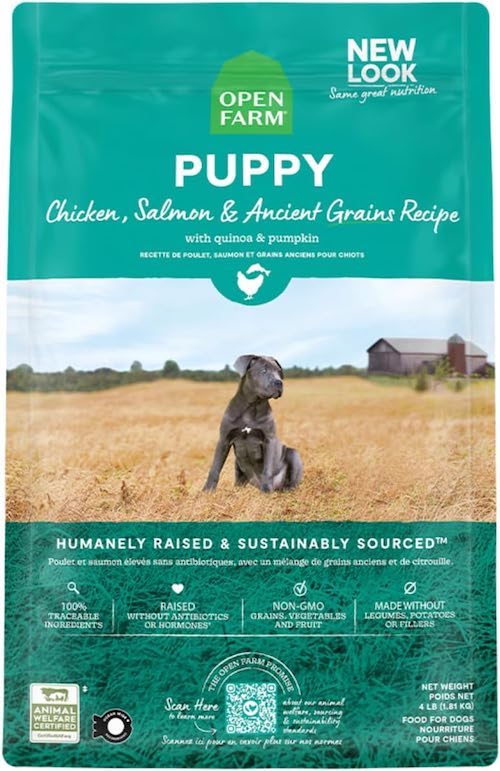
Open Farm Ancient Grains Dry Puppy Food
A brand that offers nutritious puppy food while giving back to the planet.
Open Farm is a solid option for pet parents who wish to prioritize environmental sustainability, as the brand has made some impressive efforts in this regard. For one, pet parents have the option to mail their empty packages to a facility that turns them into reusable plastic. Open Farm also relies almost exclusively on local produce to cut down on carbon emissions. And finally, all of their animal proteins are raised in humane conditions that meet the requirements of the Global Animal Partnership and Ocean Wise Seafood.
This grain-inclusive formula includes a blend of wholesome grains, including millet, brown rice, and steel-cut oats. Wild-caught salmon brings DHA to the table. Even picky eaters can get on board with this puppy kibble, as one of our finicky Rover test pups discovered.
Key Nutrients:
- 3790 kcal/kg
- Protein: 29.35%
- Fat: 17.39%
- Carbohydrate: 42.39%
- Crude Fiber: 2.17%
- Calcium: 1.40%
Ingredients: Chicken, Whitefish Meal, Oats, Salmon, Millet, Brown Rice, Quinoa, Coconut Oil, Herring Meal, Pork, Pumpkin, Natural Flavor, Carrots, Raspberries, Apples, Cranberries, Sunflower Oil, Salmon Oil, Potassium Chloride, Salt, Choline Chloride, Dried Chicory Root, Vitamin E Supplement, Vitamin A Supplement, Niacin, Supplement, Calcium Pantothenate, Riboflavin Supplement (B2), Vitamin D3 Supplement, Thiamine Mononitrate (B1), Vitamin B12 Supplement, Pyridoxine Hydrochloride, Folic Acid, Zinc Proteinate, Iron Proteinate, Copper Proteinate, Manganese Proteinate, Selenium Yeast, Calcium Iodate, Taurine, Mixed Tocopherols (Preservative), Cinnamon, Turmeric, Rosemary Extract
Best for Picky Eaters: Purina Pro Plan Sensitive Skin & Stomach Puppy Food
It’s challenging to ensure picky eaters receive the nutrients they need. And as a rule, dry kibble can be a harder sell than wet food options when it comes to palatability. But we’ve found this Pro Plan recipe is well-loved by many fussy pups.
You have your pick of two appealing protein options: salmon & rice or lamb & oat. Because it’s so fragrant, dogs are naturally attracted to omega-rich salmon. Similarly, lamb has a rich flavor and aroma that may be more tempting for your finicky puppy.
Along with an enticing taste, these Pro Plan formulas are easy on your puppy’s GI system, with digestible rice, oatmeal, and probiotics.
Key Nutrients (Salmon & Rice Recipe):
- 428 kcal/cup
- Protein: 31.82%
- Fat: 20.45%
- Carbohydrate: 44.32%
- Crude Fiber: 3.41%
- Calcium: 0.1%
Ingredients: Salmon, Rice, Barley, Fish Meal, Canola Meal, Beef Fat Preserved With Mixed-Tocopherols, Dried Yeast, Oat Meal, Pea Protein, Salmon Meal, Natural Flavor, Fish Oil, Chicory Root Inulin, Sunflower Oil, Salt, Calcium Carbonate, L-Lysine Monohydrochloride, Potassium Chloride, Taurine, Dl-Methionine, Minerals [Zinc Sulfate, Ferrous Sulfate, Manganese Sulfate, Copper Sulfate, Calcium Iodate, Sodium Selenite], Choline Chloride, Mono And Dicalcium Phosphate, Vitamins [Vitamin E Supplement, Niacin (Vitamin B-3), Vitamin A Supplement, Calcium Pantothenate (Vitamin B-5), Thiamine Mononitrate (Vitamin B-1), Vitamin B-12 Supplement, Riboflavin Supplement (Vitamin B-2), Pyridoxine Hydrochloride (Vitamin B-6), Folic Acid (Vitamin B-9), Menadione Sodium Bisulfite Complex (Vitamin K), Vitamin D-3 Supplement, Biotin (Vitamin B-7)], L-Ascorbyl-2-Polyphosphate (Vitamin C), Dried Bacillus Coagulans Fermentation Product
Best for Food Allergies: Zignature Select Cuts
While food allergies are relatively rare in dogs, some puppies will experience a reaction to certain ingredients—usually to common proteins like chicken or beef. This brand gives your pup a few alternative proteins to try.
Zignature’s Select Cuts line offers three grain-inclusive recipes with unique proteins: lamb, trout, and turkey. Each of these chicken-free diets is formulated to meet the AAFCO’s nutrient profile for all life stages. And they feature a limited ingredient list, which is ideal for more sensitive tums.
Key Nutrients (Trout & Salmon Meal Recipe):
- 376 kcal/cup
- Protein: 31.11%
- Fat: 16.67%
- Carbohydrate: 46.11%
- Crude Fiber: 6.11%
- Calcium: 1.3%
Ingredients: Trout, Salmon Meal, Oats, Millet, Natural Flavors, Sunflower Oil, Sunflower Meal, Potassium Chloride, Calcium Carbonate, Choline Chloride, Vitamins (Vitamin A Supplement, Vitamin E Supplement, Niacin Supplement, d-Calcium Pantothenate, Thiamine Mononitrate, Pyridoxine Hydrochloride, Riboflavin Supplement, Folic Acid, Biotin, Vitamin B12 Supplement), Salt, Taurine, Minerals (Zinc Proteinate, Iron Proteinate, Copper Proteinate, Cobalt Proteinate, Manganese Proteinate, Calcium Iodate, Sodium Selenite), L-Carnitine, Mixed Tocopherols (Preservative)
Best for Sensitive Stomachs: Wellness CORE Digestive Health
For puppies with GI woes, Wellness CORE may be a good choice. This recipe incorporates easily digestible ingredients like chicken and brown rice. The kibble is coated with probiotics and contains prebiotic fibers and digestive enzymes for better gut health. In turn, an optimal GI system leads to better health overall: a stronger immune system, healthier skin and coat, and improved energy levels.
Along with stomach-friendly ingredients, you’ll also find DHA and EPA to support your pup’s brain and eye development. Plus, generous levels of protein build strong muscles.
Key Nutrients:
- 398 kcal/cup
- Protein: 34.44%
- Fat: 17.22%
- Carbohydrate: 43.89%
- Crude Fiber: 4.44%
Ingredients: Deboned Chicken, Chicken Meal, Brown Rice, Barley, Oat Groats, Turkey Meal, Chicken Fat, Dried Plain Beet Pulp, Flaxseed, Marine Microalgae Oil, Pumpkin, Brewers Dried Yeast, Cranberries, Natural Chicken Flavor, Apples, Pomegranates, Potassium Chloride, Inulin, Choline Chloride, Vitamin E Supplement, Taurine, Papayas, Blueberries, Mixed Tocopherols added to preserve freshness, Calcium Carbonate, Niacin, Zinc Proteinate, Zinc Sulfate, Ferrous Sulfate, Iron Proteinate, Yucca Schidigera Extract, Vitamin A Supplement, Thiamine Mononitrate, Copper Sulfate, d-Calcium Pantothenate, Ground Cinnamon, Ground Fennel, Ground Peppermint, Copper Proteinate, Sodium Selenite, Pyridoxine Hydrochloride, Manganese Sulfate, Manganese Proteinate, Dried Enterococcus faecium Fermentation Product, Ascorbic Acid (Vitamin C), Riboflavin, Dried Bacillus coagulans Fermentation Product, Biotin, Vitamin D3 Supplement, Dried Lactobacillus bulgaricus Fermentation Product, Dried Enterococcus thermophilus Fermentation Product, Vitamin B12 Supplement, Calcium Iodate, Folic Acid, Dried Bacillus licheniformis Fermentation Product, Dried Bacillus subtilis Fermentation Product, Dried Aspergillus oryzae Fermentation Product, Dried Trichoderma reesei Fermentation Product, Dried Rhizopus oryzae Fermentation Product, Dried Lactobacillus acidophilus Fermentation Product, Dried Lactobacillus casei Fermentation Product, Rosemary Extract, Green Tea Extract, Spearmint Extract
How We Chose
The dry foods featured here were selected based on a combination of our own hands-on testing, a comprehensive look at customer reviews, and interviews with veterinary experts. We prioritized recipes with high-quality proteins, wholesome grains, and omega fatty acids. Additionally, we included brands with a focus on transparent ingredient sourcing, stringent testing protocols, and balanced nutrient levels. We’re also guided by the experience of living and playing alongside our own much-loved and strongly opinionated pets, who are never stingy with their feedback.
New Pet Parent Resources
Experiencing puppy blues? Consider Rover for a helping hand (or sturdy leash arm!). Sitters and walkers on Rover are here for all kinds of romps, including care for while you’re away. Book loving experienced dog walkers or pet sitters in your neighborhood.

